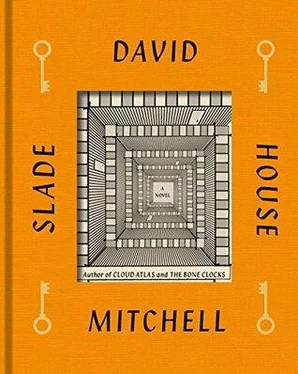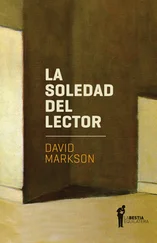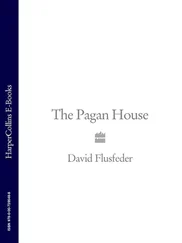David Mitchell - Slade House
Здесь есть возможность читать онлайн «David Mitchell - Slade House» весь текст электронной книги совершенно бесплатно (целиком полную версию без сокращений). В некоторых случаях можно слушать аудио, скачать через торрент в формате fb2 и присутствует краткое содержание. Год выпуска: 2015, Издательство: Random House, Жанр: Современная проза, на английском языке. Описание произведения, (предисловие) а так же отзывы посетителей доступны на портале библиотеки ЛибКат.
- Название:Slade House
- Автор:
- Издательство:Random House
- Жанр:
- Год:2015
- ISBN:нет данных
- Рейтинг книги:3 / 5. Голосов: 1
-
Избранное:Добавить в избранное
- Отзывы:
-
Ваша оценка:
- 60
- 1
- 2
- 3
- 4
- 5
Slade House: краткое содержание, описание и аннотация
Предлагаем к чтению аннотацию, описание, краткое содержание или предисловие (зависит от того, что написал сам автор книги «Slade House»). Если вы не нашли необходимую информацию о книге — напишите в комментариях, мы постараемся отыскать её.
) comes a taut, intricately woven, spine-chilling, reality-warping short novel. Set across five decades, beginning in 1979 and coming to its electrifying conclusion on October 31, 2015,
is the perfect book to curl up with on a dark and stormy night.
Slade House — читать онлайн бесплатно полную книгу (весь текст) целиком
Ниже представлен текст книги, разбитый по страницам. Система сохранения места последней прочитанной страницы, позволяет с удобством читать онлайн бесплатно книгу «Slade House», без необходимости каждый раз заново искать на чём Вы остановились. Поставьте закладку, и сможете в любой момент перейти на страницу, на которой закончили чтение.
Интервал:
Закладка:
I sit down. “Morning, Dad.”
Dad folds his newspaper. “Well, I wanted to wake you for your first African dawn, but Joy said, ‘No, let the poor lad sleep in, he flew twelve hours non-stop.’ So we’ll do all that tomorrow. Hungry?” I nod — I guess I must be — and Dad tilts his head at the kitchen hatch: “Joy? Violet? Young man needs his chow!”
The hatch opens and Joy appears. “Nathan!” I knew about Joy, who Mum calls “Your father’s dolly bird,” but it was still a jolt to see Dad holding hands with another woman. They’re going to have a baby in June, so they must’ve had sexual intercourse. The baby’ll be my half-brother or half-sister, but it hasn’t got a name yet. I wonder what it does all day. “Sleep well?” says Joy. Joy’s got a Rhodesian accent like Dad’s.
“Yes. Mad dreams, though.”
“I always have mad dreams after a long-haul flight. OJ, bacon sandwich do you, Nathan?”
I like how Joy says “OJ.” Mum would hate it. “Yes please.”
“He’ll need some coffee, too,” says Dad.
“Mum says I’m too young for caffeinated drinks,” I say.
“Horse pucky,” says Dad. “Coffee’s the elixir of life, and Rhodesian coffee’s the purest on Earth. You’re having some.”
“OJ, bacon sandwich and coffee, coming up,” says Joy. “I’ll get Violet on it straight away.” The hatch closes. Violet’s the maid. Mum often used to shout at Dad, “I’m not your bloody maid, you know, Frank!” Dad lights his pipe, and the smell of his tobacco brings back memories of when he and Mum were married. He says from the corner of his mouth, “Tell me about this dream of yours, matey.”
The gazelle’s head’s distracting, and so are Dad’s grandfather’s muskets from the Boer War and the ceiling fan. “Mum took me to see a lady, like a lord-and-lady-type lady. The house was missing so we asked a window-cleaner but he didn’t know either … then we found it, it was this big house like in To the Manor Born. There was a boy called Jonah but he turned into a big dog. Yehudi Menuhin was there too, and Mum played with him upstairs—” Dad snorts a laugh “—and then I saw a portrait of me, but my eyes were missing, and …” I see a small black iron door in the corner. “That door was there, too.”
Dad looks round. “Dreams do that. Mix reality with moonshine. You were asking about my gun-room door before you turned in last night. Don’t you remember?”
I must’ve, if Dad says so. “It all felt so real when I was in it.”
“I know it felt real, but you can see it wasn’t. Right?” I look at Dad’s brown eyes, crinkly lines, tanned skin, greyish streaks in his sandy hair, his nose like mine. A clock’s going krunk … kronk … krunk … kronk … and there’s a trumpeting noise outside, not far away. I look at Dad, hoping it is what I think it is. “Dead right, matey: a herd drifted across the river yesterday afternoon. We’ll go see ’em later, but first, line your stomach.”
“Here we go,” says Joy, placing a tray in front of me. “Your first African breakfast.” My bacon sandwich looks epic, with a treble layer of rashers, and ketchup dribbling out.
“That’s God’s Own Bacon Sarnie,” I say. Someone said that line on a sitcom I saw once and lots of people laughed.
“Well aren’t you the charmer?” says Joy. “Wonder who you get that from …”
Dad puts his arm round Joy’s waist. “Try the coffee first. It’ll make a man of you.” I lift the mug and peer down. Inside’s black as oil, as holes in space, as Bibles.
“Violet ground the beans just now,” says Joy.
“God’s Own Coffee,” says Dad. “Drink up now, matey.”
Some stupid part of me says, No, don’t, you mustn’t .
“Your mother’ll never know,” says Dad. “Our little secret.”
The mug’s so wide it covers my nose like a gas-mask.
The mug’s so wide it covers my eyes, my whole head.
Then whatever’s in there starts gulping me down.
Time passed, but I don’t know how much. A slit of light opens its eye and becomes a long flame. Cold bright star white. A candle, on a candlestick, on the scarred floorboards. The candlestick’s dull silver or pewter or lead and it’s got symbols on it, or maybe letters from a dead language. The flame’s not moving, it’s as if time’s unspooled and jammed. Three faces hang in the gloom. Lady Grayer on my left, but she’s younger now, younger than Mum. To my right is Jonah Grayer but he’s older than the Jonah in the garden. They’re twins, I think. They’re wearing gray cloaks with hoods half down; his hair’s short and hers is long, and its gold instead of black like before; and they’re kneeling like they’re praying, or meditating. They’re still as waxworks. If they’re breathing, I can’t see it. The third face is Nathan Bishop’s, opposite me. I’m a reflection in a mirror, a tall rectangle, standing on the floor. I’m still wearing the tweed jacket from Oxfam, and the bow-tie. When I try to move, I can’t. Not a muscle. I can’t turn my head, or lift my hand, or speak, or blink, even. Like I’ve been paralyzed. It’s scary as hell, but I can’t even go Mmmfff like scared gagged people do. I’m pretty sure this can”t be heaven or hell, but I know it’s not Rhodesia. Dad’s lodge was a kind of vision. I’d pray it’s only the Valium making me see this, but I don’t believe in God. I’m in an attic, judging from the sloping ceiling and rafters. Are the Grayers prisoners like me? They look like the Midwich Cuckoos. Where’s Yehudi Menuhin, all the guests, the soirée? Where’s my mum?
The flame comes to life, and the symbols on the candlestick change, and keep changing as if it’s thinking fast and the symbols are its thoughts. Jonah Grayer’s head shifts. His clothes rustle. “Your mother sends her apologies,” he says, touching his face as if he’s testing whether it still fits. “She had to go.” I try to ask, “Where?” but nothing I need to speak — jaw, tongue, lips — works. Why would Mum leave without me? The me in the mirror gazes back. Neither of us can move. Norah Grayer’s flexing her fingers like she’s just waking up. Did they inject me with something? “Every time I come back to my body,” she says, “it feels less of a homecoming, and more entering an alien shell. A more enfeebled one. Do you know, I want to be free of it?”
“Be careful what you wish for,” says Jonah. “If anything happened to your birth-body, your soul would dissolve like a sugar cube and—”
“I know perfectly well what would happen.” Norah Grayer’s voice is chillier and throatier now. “The hairdresser paid an uninvited visit, I saw.”
Jonah asks, “What hairdresser are you talking about?”
“Our previous guest. Your ‘Honey Pie.’ She appeared in a window. Then on the stairs, by her portrait, she tried to give some sort of a warning to the boy.”
“Her afterimage showed up in a window, you mean. It happens. The girl is gone, as gone as a smoke ring puffed out years ago in a gale off Rockall. It’s harmless.”
A brownish moth fusses around the candle-flame.
“They’re getting bolder,” says Norah Grayer. “The time will come when a ‘harmless afterimage’ will sabotage an Open Day.”
“If— if— our Theatre of the Mind were ever ‘sabotaged’ and a guest escaped, we’d simply call our friends the Blackwatermen to bring them back again. That’s why we pay them. Handsomely.”
“You underestimate ordinary people, Jonah. You always did.”
“Would it kill you, Sister, to once, just once, say, ‘Top job, a superb orison, you’ve landed us a juicy, tenderized soul to pay the power bills for the next nine years— bon appetit! ’?”
Читать дальшеИнтервал:
Закладка:
Похожие книги на «Slade House»
Представляем Вашему вниманию похожие книги на «Slade House» списком для выбора. Мы отобрали схожую по названию и смыслу литературу в надежде предоставить читателям больше вариантов отыскать новые, интересные, ещё непрочитанные произведения.
Обсуждение, отзывы о книге «Slade House» и просто собственные мнения читателей. Оставьте ваши комментарии, напишите, что Вы думаете о произведении, его смысле или главных героях. Укажите что конкретно понравилось, а что нет, и почему Вы так считаете.












